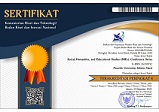Mathematics Problem Solving Abilities of Indonesian School Students in Sekolah Indonesia Luar Negeri (SILN) based on Polya’s Theory in terms of the Pragmatic Philosophy
Abstract
This study aims to analyze the mathematical problem-solving abilities of Indonesian School Students in Sekolah Indonesia Luar Negeri (SILN) located in Sabah-Sarawak, Malaysia based on Polya’s theory, viewed through the lens of Pragmatic philosophy. This research method is qualitative. This study employed a descriptive qualitative approach to explore the learning difficulties faced by Indonesian School Students in Sekolah Indonesia Luar Negeri (SILN), particularly in the topic of Two-Variable Linear Equation Systems (SPLDV). According to Polya, effective problem-solving involves four stages: understanding the problem, devising a plan, carrying out the plan, and evaluating the solution. Meanwhile, Pragmatic philosophy emphasizes learning through real-life experiences, suggesting that students achieve meaningful mathematical understanding when they are able to solve problems encountered in their daily lives. The findings reveal that aligning mathematics instruction with students' everyday contexts in Sekolah Indonesia Luar Negeri (SILN) enhances their ability to solve mathematical problems effectively. As such, incorporating the principles of Pragmatic philosophy into mathematics education is essential to support and strengthen students’ problem-solving skills
Keywords
Full Text:
PDFRefbacks
- There are currently no refbacks.





